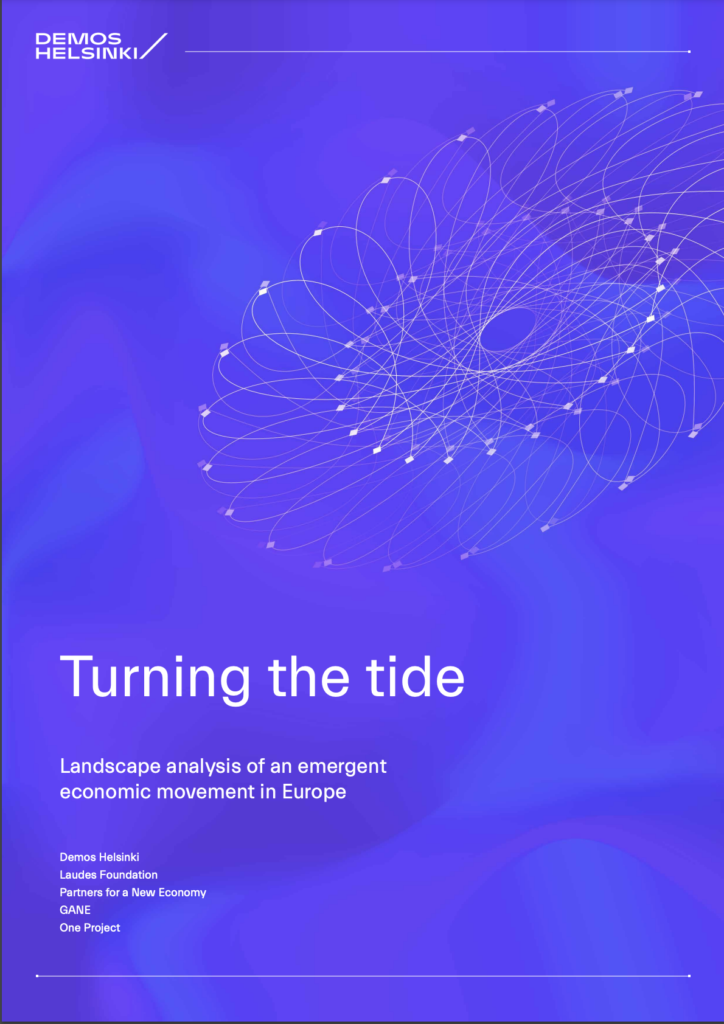The neoliberal project is under pressure. However, years of discontent with the environmental risks and economic inequalities have not led to a collective and organised proposal for a new economic system. This report presents a landscape analysis of the organisations working in Europe to create an economic paradigm shift. Who and where are they? How are they contributing to this cause? What are the steps to foster a thriving and joyful movement that will create an economy that serves the people and the planet?
The neoliberal project is under pressure. However, years of discontent with the environmental risks and economic inequalities have not led to a collective and organised proposal for a new economic system. Or, at the very least, proposals have been marked as “alternative” or “heterodox”. They also usually break apart when faced with the pervasive solidity of neoliberalism.
Laudes Foundation, Partners for a New Economy, Demos Helsinki, Global Assessment for a New Economics (GANE) and One Project carried out a landscape analysis of the organisations working in Europe to create an economic paradigm shift. Who and where are they? How are they contributing to this cause? What are the steps to foster a thriving and joyful movement that will create an economy that serves the people and the planet?
Key findings
We combined a desk study and interviews with several selected practitioners to generate a list of 128 new economic organisations and examine their different pathways for achieving impact. This analysis depicts the following:
- A diversity of focus areas, including proposed solutions and sectors of operation.
- A geographic distribution that skews towards Western Europe.
- Different theories of change, defined as the organisations’ internal theories of how transformations happen in society.
- Four ways to frame action, i.e. the ways the organisations choose their activities and focus.
- Eight transformational levers employed to enable or achieve change in our current economic systems (coalition-building, idea generation, policy advocacy, affecting public discourse, transformative education, delivering, campaigning, and funding).
DOWNLOAD THE MAP
(Last update: February 2022)
Our published report and map featured a list of 128 organisations, but we are aware there are even more teams that are challenging the current economic paradigm. We are thus hosting an evolving online list of organisations of new economic actors that can hopefully serve as a resource for the emerging movement too. Do you feel your organisation should be included? You can get in touch with us at (hello@demoshelsinki.fi).
LIST OF ORGANISATIONS (updated)
Recommendations
As with every kind of nascent movement, there is a period of misalignment, ideological disagreement, tactical disparity, and, consequentially, a sense of dissonance. We believe that the thematic, tactical and strategic plurality that we have observed in this community should be seen hereon as a strength.
The study proposes four recommendations for the actors in the new economic thinking landscape in Europe:
- Commit to uncompromised collaboration. New economic actors should embrace the intrinsic pluralism of the nascent movement to regenerate economic thinking, despite tactical or ideological disagreements.
- Rally behind shared symbols. A great example is the LGBTQ+ pride flag, which exemplifies how to bring together a pluralistic movement through symbols.
- Develop incentives and tools for collaboration to support the actors’ organisational growth. Funders should provide incentives for collaboration in long-term funding opportunities while also promoting platforms enriched with shared decision-making.
- Exploit the disruptive power of crises. The COVID-19 pandemic has exposed with terrifying clarity the flaws of neoliberalism. Challenging neoliberalism requires challenging power, and crises are apt moments to do so.
Regenerating economic thinking
Transformations neither are nor can be linear. We hope that two things will happen moving forward. First, we hope we continue to deliberate on what we need from our economies. Second, we hope this nascent movement will present an example that will completely disprove that pragmatism equals pessimism. An economic transformation will require a commitment to the cause that we can only approach through curiosity, intention, and humility.
From promise to practice, the emerging landscape we uncovered has an incredible window of opportunity to establish itself as a movement. Let’s put our trust in it, but let’s also hold ourselves accountable for our collective future—that of our planet and generations to come. Our time here may be limited, but our moment is now.
Let’s make it matter.
Read more
To shed light more broadly on the state of new economic thinking, we conducted interviews with members of this community in four different countries.
- New economic thinking in Greece — “Pregnant” with promise
- New economic thinking in France — Small but vibrant
- New economic thinking in Finland — Action on the fringes
- New economic thinking in the UK — A curious paradox
For further information please contact:
Johannes Nuutinen, Demos Helsinki, johannes.nuutinen@demoshelsinki.fi
Anna Watt, Laudes Foundation, a.watt@laudesfoundation.org


What is new economic thinking?
Post
January 11, 2022
New economic thinking in Finland — Action on the fringes
Post
January 11, 2022
New economic thinking in France — A small but vibrant space
Post
January 11, 2022
New economic thinking in Greece — “Pregnant” with promise
Post
January 11, 2022
New economic thinking in the UK — A curious paradox
Post
January 11, 2022
What’s going on with GDP? Rethinking economic success
Post
March 7, 2025
Building a new economy
Theme
December 1, 2025